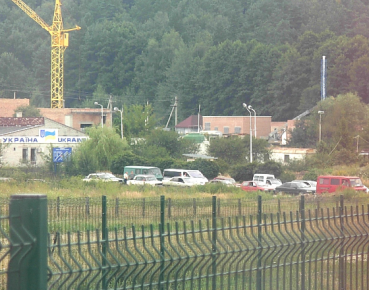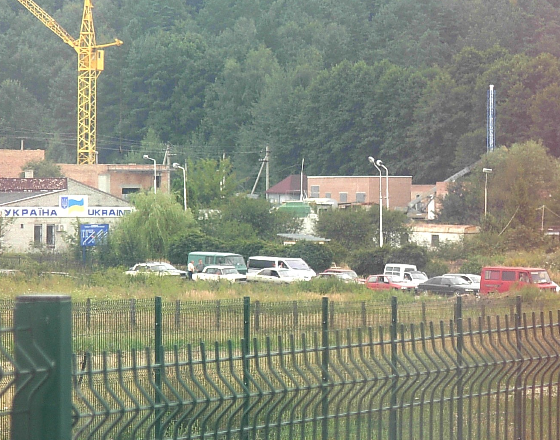Tydzień w gospodarce
Category: Trendy gospodarcze

Polish-Ukrainian border (Foma, CC BY-SA 3.0)
Ukrainian emigrants see both Poland and Germany as equally attractive destinations. Among the workers who participated in a study conducted by the Ukrainian job posting site OLX Rabota, 46 per cent indicated Poland as the place where they would like to work, while 47 per cent picked Germany. The other top choices are the Czech Republic (35 per cent), Sweden (18 per cent) and Israel (14 per cent).
“Poland is the most attractive destination for Ukrainian economic migrants. Almost half of all respondents would like to find work in that country. In the survey, 6 out of 10 respondents indicated that they had already worked in Poland for a few months. Among these people, 43 per cent were employed in the manufacturing sector and 23 per cent worked in the construction industry. The main factors motivating people to seek work in Poland include the geographic proximity to Ukraine (57 per cent of responses), high wages (60 per cent), as well as similar mentality shared by the two countries (26 per cent),” report the authors of the study.
The dominant sentiment among Ukrainian economic migrants was perfectly captured by Yuri Romanenko, the head of the Kiev-based think-tank Institute for the Future, who visited Poland in mid-December. “In Warsaw I met with friends — young people aged 25 and over. None of them intend to come back to Ukraine. God forbids. The government’s promises of loans at an interest rate of 5 per cent, as well as other populist tales, are met with ridicule. Ukraine has become too toxic for people who have got accustomed to working with their brain, and who no longer believe in the constant claims of the authorities that everything will soon fall into place, that they are already doing what is needed, and that the people simply need to trust them and everything will work out. They are shocked to hear that in Ukraine it is still common for companies to delay the payment of wages. People quickly forget that life in our country means a daily struggle to survive and to overcome adversity,” said Mr. Romanenko.
The average age of a Ukrainian economic migrant is 25 to 54 years old. It’s worth noting that less than half of them – 43 per cent – are married and have children. The main criteria that potential migrants take into consideration when choosing a destination country include high wages and good working conditions. Among the Ukrainian migrants who are going abroad for the first time, 38 per cent plan to work in another country for several months. No more than 12 per cent of the surveyed first-time migrants are determined to stay abroad permanently.
Meanwhile, the average economic migrant who wants to leave Ukraine permanently seems to fall on the opposite end of the socioeconomic spectrum. These people are usually younger, and their average age is around 26. They are married, but do not have children yet. They typically live in one of Ukraine’s regional capitals. These workers are typically university graduates. Interestingly enough, they usually have relatively high incomes — compared with the average earnings in Ukraine — that allow them to purchase virtually everything they want. Even though such people should theoretically be satisfied with their lives, they still want to leave Ukraine permanently.
Around 80 per cent of Ukrainian economic migrants want to earn more than USD1,000 per month while working abroad. More than half expect their foreign wage to be higher than USD1,500, while 27 per cent would be satisfied with an amount in the range of USD1,000-1,200, and 19 per cent want to earn USD1,200-1,500. However, reality falls short of these expectations. Only one-third of economic migrants from Ukraine were actually paid USD1,000 or more while working abroad. Roughly the same percentage earned USD700-1,000 per month, while 18 per cent were paid USD500-700.
Economic migrants are willing to take up employment in fields other than their trained professions — up to 39 per cent of the surveyed workers are willing to accept any job, and only 23 per cent want to work exclusively at a position matching their education. The most popular sector is industry (32 per cent), while 12 per cent would like to work as drivers.
There is a clearly visible divisions between people who have already been abroad as seasonal workers, and those who haven’t yet left the country, but would like to emigrate permanently. In the first group, only 9 per cent intend to leave the country again in order to find employment as seasonal workers.
The economic migrants who have returned home would be willing to go abroad again if they were able to get higher wages — 80 per cent of the respondents in that group indicated that only earnings higher than USD1,000 would encourage them to seek employment abroad. Meanwhile, 10 per cent would be willing to go abroad if they earned at least USD2,000, and only 21 per cent would like to work abroad for less than USD1,000.
Among the people who have worked in Poland and who do not intend to leave Ukraine again, as many as half indicated that the psychological discomfort associated with separation from family was the main reason for their reluctance. About 40 per cent of those who do not want to leave their country again had experienced conflicts with their employers. The overall situation in this respect wasn’t that bad, however, since as many as two thirds of all emigrants declared that they had had good relations with their employers.
One group that Polish employers should certainly target in their search for workers are women, who are currently underrepresented in the overall population of economic migrants. According to the survey, as many as 76 per cent of the people who have already worked abroad are men. Polish employers searching for seasonal workers should also pay attention to Ukrainian pensioners – as many as one-third of them would like to work abroad for a few months.
Polish employers were competing for workers with companies operating in Ukraine, so it’s worth taking a look at another study, which illustrates the current situation on the Ukrainian labour market and the factors that Ukrainians take into consideration when looking for employment. As many as 57 per cent of Ukrainian workers are not satisfied with their earnings. This is not surprising, since as many as 59 per cent of them earn less than UAH10,000, which is less than USD367 per month, even though the prices of many food products in Ukraine are much higher than in Poland. Moreover, as many as 37 per cent of Ukrainian workers earn less than UAH7,000, which is less than USD257.
However, earnings are not what Ukrainian workers care the most about. The main priority for them is the comfort and safety of the workplace, the proximity of the workplace to their place of residence, and the technological advancement of working equipment. It’s easy to understand the importance of these elements considering that in Ukraine there is in fact no free health care and workers have to pay a lot of money from their own pockets for each medical procedure related to an accident at work. Moreover, public transportation in Ukraine is in such a disastrous state that it’s best to avoid it altogether if possible. Among the surveyed workers, 26 per cent complained about the conditions in their workplace, while 22 per cent were unhappy about the lack of an employee benefits package.
The expectations listed by Ukrainian employees are not excessive — two-thirds of them expect to be provided comfortable conditions of employment and earnings corresponding to the market conditions. About 47 per cent of the workers expect to be rewarded with a bonus for good performance, 28 per cent would like to get employer-provided health insurance, and 22 per cent would like to have the ability to take a day off work upon request. Other elements indicated as important include a friendly work schedule, good atmosphere in the team, good promotion prospects, the location of the workplace and legal employment.
“It is no secret that wages alone are not enough to keep employees in a company. When asked whether the level of earnings was the key factor in their employment-related decisions, 46 per cent of the surveyed workers indicated that they cared about both the monetary remuneration, as well as the intangible factors. A further 17 per cent of the survey respondents indicated that they were more focused on non-financial factors such as: the location of the workplace, the reputation of the company, the atmosphere in the team, etc.,” point out the authors of the study.
However, as many as 70 per cent of the potential economic migrants have concerns associated with working abroad. They are mostly afraid of a situation in which the employer fails to pay the remuneration specified in the employment contract (53 per cent). The second most commonly indicated concern related to the employer’s bad attitude towards employees (42 per cent). The authors of the study point out that women are more concerned about financial issues and the mental discomfort associated with separation from their loved ones than men. At the same time, the younger the potential economic migrant, the greater their fear of possible problems they might encounter abroad — as many as 60 per cent of people aged 25 to 35 have concerns relating to the timely payment of wages, while among those aged 45-54 only 49 per cent are concerned about this. Meanwhile, concerns about the conditions of life abroad were expressed by 36 per cent of residents of regional capitals, 30 per cent of residents of small towns, and only 21 per cent of residents of villages. These results reflect the current living conditions in Ukraine, with the neglected and underdeveloped rural areas whose residents are well accustomed to difficult living conditions.
The main factors influencing the employment decisions of economic migrants who have already worked abroad and who are willing to leave the country again include the timely payment of wages, the good attitude of employers towards employees, the possibility of legal employment pursuant to an official contract, safe working conditions, and regular working hours.
There were over 220 thousand Ukrainians with residency permit in Poland and around a million of seasonal workers. Till the COVID-19 pandemic Poland was the most popular destination for Ukrainian migrant workers, having surpassed Russia — the previous top choice — over the course of the past several years. By the end of March 2020, thousands of Ukrainians, approx. 20 per cent of Ukrainian workforce in Poland, queued in long lines at the border crossings between Poland and Ukraine to get to their homeland before Ukraine closed its borders due to the pandemic.
According to Euroactive.com Polish farmers appealed to the Prime Minister Mateusz Morawiecki to allow Ukrainians to stay, because the lack of them may threaten the security and maintenance of the food supply chain. The Polish government has introduced some measures to make migrant’s lives easier. Those with expired visas will be able to extend them up to 30 days after Poland’s government will announce the end of epidemic.

